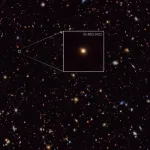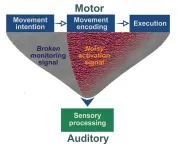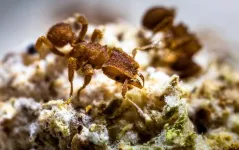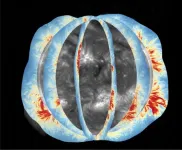(Press-News.org) Houston Methodist researchers will be part of a national consortium funded by an up to $49 million award from the U.S. Government’s Advanced Research Projects Agency for Health (ARPA-H) to develop a vaccine against two of the most common and destructive strains of herpesviruses that latently infect a majority of Americans and can lead to acute infections, multiple forms of cancer, autoimmune disease and birth defects.
The award is part of ARPA-H’s Antigens Predicted for Broad Viral Efficacy through Computational Experimentation (APECx) program and will fund the America’s SHIELD project to develop prophylactic and therapeutic vaccines against the β- and γ- herpesviruses. Through the SHIELD (Strategic Herpesvirus Immune Evasion and Latency Defense) program, researchers will develop an integrated computational toolkit for antigen engineering with the potential to transform vaccine development against a myriad of pathogens.
These two herpesvirus subfamilies include human cytomegalovirus and Epstein-Barr virus, respectively, which clinically impact the largest proportion of the U.S. population, dormantly infecting Americans at an annual cost of at least $4 billion.
Epstein-Barr causes significant disease in adolescents and young adults as the cause of mono and also can later cause lymphomas, gastric and nasopharyngeal cancer, multiple sclerosis and diseases like non-Hodgkin’s lymphoma and certain leukemias in transplant patients. The human cytomegalovirus is the leading cause of congenital birth defects, as in-utero infection can result in permanent hearing loss or more profound neurodevelopmental impairments that disproportionately impact socioeconomically disadvantaged children.
Jimmy D. Gollihar, Ph.D., who is a protein engineer, synthetic biologist and head of the Antibody Discovery & Accelerated Protein Therapeutics (ADAPT) laboratory at the Houston Methodist Research Institute, is a co-principal investigator with Erica Ollmann Saphire, Ph.D., M.B.A., president, CEO and a professor with the La Jolla Institute for Immunology and project leader of the consortium. They are among a team of leading scientists from 19 laboratories across the U.S. that are working on herpesviruses.
As one of the artificial intelligence and machine learning experts of this consortium, Gollihar will generate new gene sequences encoding viral antigens for these mRNA vaccines through the ADAPT lab, which is a modern synthetic biology and protein engineering lab. During the COVID-19 pandemic, Gollihar’s group was directly involved in genomic surveillance, antigen production, serological testing and use of convalescent plasma, as well as monoclonal antibody discovery and engineering.
“A critical and innovative aspect to our strategy is the targeting of antigens essential to distinct stages of viral infection – beyond initial entry – to also include cell-to-cell spread, immune evasion and the reactivation stages linked to cancer, autoimmune disease and other complications,” Gollihar said.
Joining Gollihar from Houston Methodist are co-investigators John P. Cooke, M.D., Ph.D., who is the medical director of the Center for RNA Therapeutics, and Francesca Taraballi, Ph.D., who is the director for the Center for Musculoskeletal Regeneration and also works closely with Cooke as a faculty member in the Center for RNA Therapeutics.
Led by Cooke, the Houston Methodist Research Institute’s RNA Core, which has the capacity to synthesize molecular targeted drugs for first-in-human clinical trials under tightly controlled FDA regulations, will generate these mRNA herpesvirus vaccines. Taraballi, who also is an adjunct faculty member with the Department of Nanomedicine, will provide a nanoscale drug delivery platform with her group that will encapsulate the vaccines in lipid nanoparticles (LNPs) for testing and validation by the other investigators.
By integrating advanced computational models with immunological data, this comprehensive, multidisciplinary approach will not only accelerate herpesvirus vaccine development, but also will enable the rapid design and optimization of immunizing agents to trigger an immune response in the body against a myriad of other viruses. This will facilitate swifter responses to emerging viral threats, potentially transforming vaccine development and preparedness for future pandemics.
For more information about Houston Methodist, visit our newsroom or our social media pages on X, Facebook, LinkedIn, Instagram and TikTok or our On Health and Leading Medicine blogs.
###
END
SAN ANTONIO, Oct. 3, 2024 – The School of Dentistry at The University of Texas Health Science Center at San Antonio (UT Health San Antonio) earned the first National Institutes of Health grant under its new Center for Pain Therapeutics and Addiction Research, addressing pain in patients with head and neck carcinoma.
The nearly $600,000 grant by the NIH’s National Institute of Dental and Craniofacial Research will address this critical pain issue that significantly impairs quality of life. Many head and neck carcinoma patients require opiate pain management, but tolerance develops quickly, requiring new pain ...
Public health degree programs provide key competencies demanded by employers, but graduate employability could be improved by using more real-time data from employer job postings, according to a new study at Columbia University Mailman School of Public Health. This could help public health schools and programs ensure that graduates obtain specific technical skills listed in job postings, meet current employer needs, and prepare graduates for the demands of today’s labor market. The findings are published in the American Journal of Public Health.
The competencies required for the ...
Since the 2020 murder by Minneapolis police of George Floyd brought nationwide calls for change amid concerns that prevailing practices were not grounded in evidence and created harm, policing has been in turmoil. Implementation science (IS) involves integrating effective and evidence-based innovations into routine practice in fields like health care. Yet despite its potential, IS—and specifically, evidence-based policing (EBP)—remain vastly understudied and unused in police settings. In a new article, researchers provide an orientation to these issues ...
Frothy or smooth, bitter or sweet, light or dark: There’s a beer for most palates. As people around the world pour over the best brews at Oktoberfest celebrations or ferment about their favorite fall-themed beers, three papers published in ACS journals crack open new insights into these beverages. And if you’re hop-ing to conduct studies to find which beer is good for what ales you, please drink responsibly. Reporters can request free access to these papers by emailing newsroom@acs.org.
Coriander’s origin changes beer flavor. Just like simmering a stew, brewing a beer with herbs and spices can enhance its flavor. A study in ACS Food Science ...
Washington, D.C. — The American Association for the Advancement of Science, one of the world’s largest general scientific societies and publisher of the Science family of journals, announces an external research project to help the organization reimagine AAAS.org as part of a website overhaul project, which recently kicked off. AAAS is seeking input from its key audiences, including reporters and public information officers, to better align the experience and content of the website. As AAAS embarks on the next ...
Looking deep into the early universe with NASA’s James Webb Space Telescope, astronomers have found something unprecedented: a galaxy with an odd light signature, which they attribute to its gas outshining its stars. Found approximately one billion years after the big bang, galaxy GS-NDG-9422 (9422) may be a missing-link phase of galactic evolution between the universe’s first stars and familiar, well-established galaxies.
“My first thought in looking at the galaxy’s spectrum was, ‘that’s weird,’ which is ...
Moscow, Idaho, October 3, 2024: New research showing the association between greater bean and pulse consumption and improved shortfall nutrient intakes and a higher diet quality in American adults will be presented during the Academy of Nutrition and Dietetics (the Academy) Food & Nutrition Conference & Expo (FNCE) 2024 in Minneapolis, MN. The poster session is scheduled for Tuesday, October 8, 2024, from 10:45 – 11:45 AM CT at the Minneapolis Convention Center.
Researchers assessed the effect of increased bean and pulse consumption, in the typical US dietary pattern, on shortfall ...
Auditory hallucinations are likely the result of abnormalities in two brain processes: a “broken” corollary discharge that fails to suppress self-generated sounds, and a “noisy” efference copy that makes the brain hear these sounds more intensely than it should. That is the conclusion of a new study published October 3rd in the open-access journal PLOS Biology by Xing Tian, of New York University Shanghai, China, and colleagues.
Patients with certain mental disorders, including schizophrenia, often hear voices in the absence of sound. Patients may fail to distinguish between their ...
When humans began farming crops thousands of years ago, agriculture had already been around for millions of years. In fact, several animal lineages have been growing their own food since long before humans evolved as a species.
According to a new study, colonies of ants began farming fungi when an asteroid struck Earth 66 million years ago. This impact caused a global mass extinction but also created ideal conditions for fungi to thrive. Innovative ants began cultivating the fungi, creating an evolutionary partnership that became even more tightly intertwined 27 million years ago and continues to this day.
In a paper published today, Oct. 3, in the journal Science, scientists at the Smithsonian’s ...
EMBARGOED: Not for Release Until 2:00 pm U.S. Eastern Time Thursday, 3 October 2024.
A new era of solar observation
International team produces global maps of coronal magnetic field
Contacts:
Audrey Merket, NSF NCAR and UCAR Science Writer and Public Information Officer
amerket@ucar.edu
303-497-8293
David Hosansky, NSF NCAR and UCAR Manager of Media Relations
hosansky@ucar.edu
720-470-2073
For the first time, scientists have taken near-daily measurements of the Sun’s global coronal magnetic field, a region of the Sun that has only been observed irregularly in the past. The resulting observations ...






